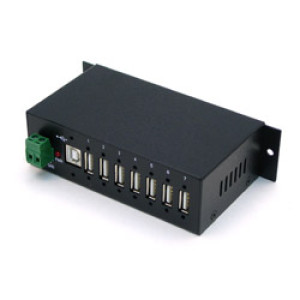Your shopping cart is empty!
MENU

USB is how data is moved into and out of computers. Scientific, industrial and commercial operations of every size rely on USB for storage and transfer of measurement data, images and test results. USB is used so extensively for peripherals and devices that users often find their computers don't have enough USB ports. When that happens, the solution is a USB hub.
A USB hub is like an electrical extension cord: it lets multiple devices connect to one socket on the computer. Inexpensive hubs often lack features ensuring reliability and robustness. Data corruption is a real possibility and high-value equipment could be put at risk. That's why only industrial-grade USB hubs and isolators are suitable for the factory, laboratory or business environment.
The universal serial bus (USB) interface appeared in the mid 1990's. USB 2.0 arrived in the early 2000's with data transfer speeds of up to 480Mbps. More recently, USB 3.0 (“SuperSpeed USB”) has been gaining traction with a speed of 5Gbps.
Hubs are available for each version of USB, and usually provide backwards compatibility, though at the speed of the lowest component. To avoid the hub becoming the bottleneck consider purchasing a USB 3.0 hub unless there's no likelihood of ever attaching a USB 3.0 device.
An isolator is a device with a USB input and output but no direct electrical connection between the two. It is used for protecting the computer, (and possibly the equipment at the other end of the USB cable) from ESD, lightning, power surges, EMI/RFI and problems caused by ground loops. The Antaira USB-14010-SI isolator provides 2,500 Vrms of protection.
Cameras, portable hard drives and CD/DVD drives are a few of the devices that draw power from the USB interface. When connecting such equipment through a hub to a computer, the hub will need a separate power source. Not all hubs are powered, so consider if this will be needed.
The rectangular and square A-type and B-type USB connectors hold the cable in place by friction. Repeated plugging and unplugging lowers the pull-out force. Additionally, vibration and temperature changes can make a cable fall out. Industrial devices prevent this with screw connectors from cable to hub body.
Other features to look for are surge protection, the ability to accept an industrial 24 VDC power supply and a metal case that can be easily mounted. DIN rail mounting kits make it easy to fit the hub or isolator in an electrical cabinet.
Westward Sales offers industrial-grade hubs produced by Antaria Technologies. These carry a 5 year warranty. The USB-HUB4K3 provides four USB 3.0 ports. The USB-HUB7K and USB-HUB4K have seven and four USB 2.0 ports respectivley. Screw connectors, metal enclosures and surge protection are standard.
Whether it’s a new industrial project or an upgrade, Westward Sales has communication solutions that will save you time and energy. Contact one of our knowledgeable representatives today!